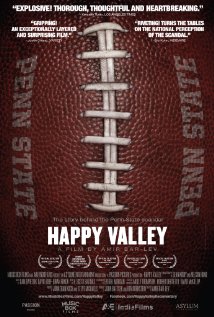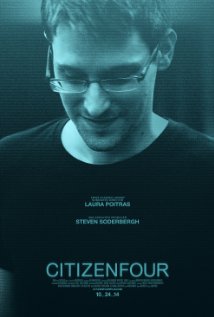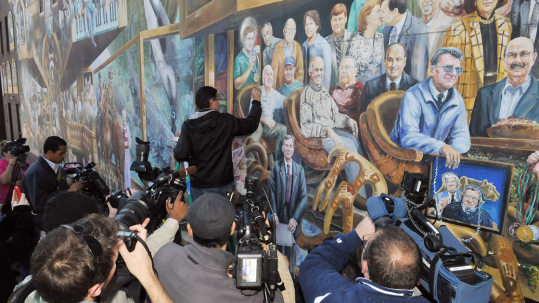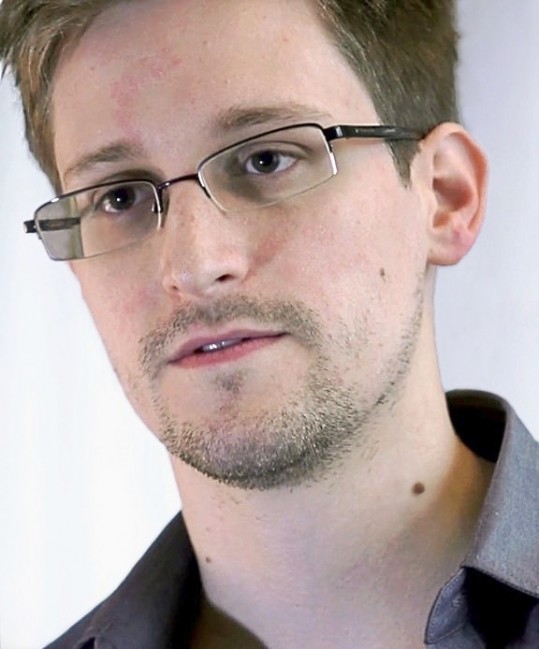

Two very good documentaries, one just released and the second soon to be released, worthy of your attention:
Happy Valley ****1/2 Due for release this month, Happy Valley is Director Amir Bar-Lev‘s careful examination of what happened to a community as a result of the child sexual abuse charges against Penn State assistant coach Jerry Sandusky’s.
Due for release this month, Happy Valley is Director Amir Bar-Lev‘s careful examination of what happened to a community as a result of the child sexual abuse charges against Penn State assistant coach Jerry Sandusky’s.
In this documentary, Bar-Lev chooses not to focus on Sandusky nor on the direct victims of the 40 counts of abuse. Rather, he looks at what those charges and revelations had on head coach Joe Paterno, his family, the students of Penn State, and particularly the Happy Valley (the term used to describe the town of State College, the home of Penn State University).
There are no new revelations in this film as the facts of what occurred are largely well known.
What is new is the focus on specific individuals — Joe Paterno, his wife (Sue) and his two sons (Scott and Jay), Joe Posnanski (Paterno’s biographer), Matt Sandusky (adopted child of Jerry Sandusky), a Penn State student, and Michael Pilato, the artist who painted the (now altered) half block mural Inspiration that still can be seen at Penn State (as opposed to Paterno’s statute which has been removed). And above all, the focus is on the community, on Happy Valley.
Bar-Lev is largely able to show various perspectives, how all ‘sides’ reacted and felt, and what happened to a once ‘idyllic’ part of America. His attempt, largely successful I think, is to be thorough (and fair?) in his portrayal of the events and their aftermath.
I suspect individuals who see Happy Valley will not be unanimous in their judgements about where the guilt lies (beyond Sandusky). Was Paterno treated unfairly? Was he in part responsible for allowing Sandusky to continue his abuse of kids? Was the University administration the real enabler? Was the community’s worship of Paterno and Penn State football in anyway responsible for what happened? Did the community’s passion for football itself in someways drive what happened to Happy Valley?
See the film with others and be prepared for a no doubt lively discussion that will follow.
Citizenfour ****1/2

If you don’t know much about Edward Snowden, Citizenfour is worth seeing. It will give you the opportunity to make up your own mind about who he is, what kind of person he is, and judge his motivations for yourself. Is he a traitor, a hero, or something in between. Or none of those?
If you already know something about Edward Snowden, it is still worth your time to see Citizenfour. Not only will you be able to judge him for yourself, you will be able to watch him in real time.
One strength, perhaps the biggest strength of Citizenfour, is that you are in the room with Snowden as his story unfolds. You get to see him as he ‘comes out’ to filmmaker Laura Poitras and writers Glenn Greenwald and Ewen MacAskil. While some shots from this filming have been aired previously, in this documentary, you are present as history unfolds.
It’s mid 2013 as Snowden is ensconced (trapped?) in a hotel in Hong Kong and as he reveals his story to Poitras, Greenwald, and MacAskil. There’s a bit of a ‘thriller’ aspect to Citizenfour, even though we know that ultimately Snowden will ‘settle’ in Moscow, where he finds himself stranded as he attempts to go to South America. While the audience knows what is going to happen, Snowden, Poitras, etc. do not.
Documentarian Laura Poitras lets her camera be the observer and medium for us to learn about and make judgements about Snowden. We never see Poitras or even learn much about her. She’s a documentary film director and producer whose My Country, My Country was nominated for an Academy Award and who won the 2013 Polk Award for national security reporting. Along with Greenwald, MacAskil, and Baron Gellman, her work led to the 2014 Pulitzer Prize for Public Service being awarded to The Guardian and The Washington Post.
I’ve posted earlier about Snowden, Greenwald, and the NSA’s gathering of information on all of us. (See No Place to Hide for a much more thorough review of these issues) And while I think Greenwald’s book in many ways is superior to Poitras film (it goes well beyond Snowden), Citizenfour, at a minimum, is a good introduction to the issues developed much more fully in No Place to Hide.
The final portions of Citizenfour strongly hint at future revelations, some that are beyond the information Snowden himself gave to Poitras, Greenwald, and others. Perhaps there is a second individual involved in some of the stories to come.
The film also reminds me of the early 70s and how I felt when I use to open the Washington Post each morning to read about Daniel Ellsberg and the Pentagon Papers, and even more so about the latest revelation from Woodward and Bernstein about the unfolding Watergate scandal.
While the Watergate story led to the resignation of President Nixon, something no one expected when the story first broke, we don’t know where these NSA revelations will lead. For me, the issues involved here are even more crucial and more important than those of the cover up and illegal actions of one president.
Multiple presidents have been involved in the NSA’s actions – the violations of the Constitution, the lying to Congress, and the increasing threats to our freedoms.
This story is not over.
Whether Citizenfour is your introduction to these issues or simply one (important) piece of what is occurring in our country, it’s worthy of your time and attendance.


lizFrost said:
Thank you for the information. I will keep my eye open for the films at The Palm Theater in San Luis Obispo.